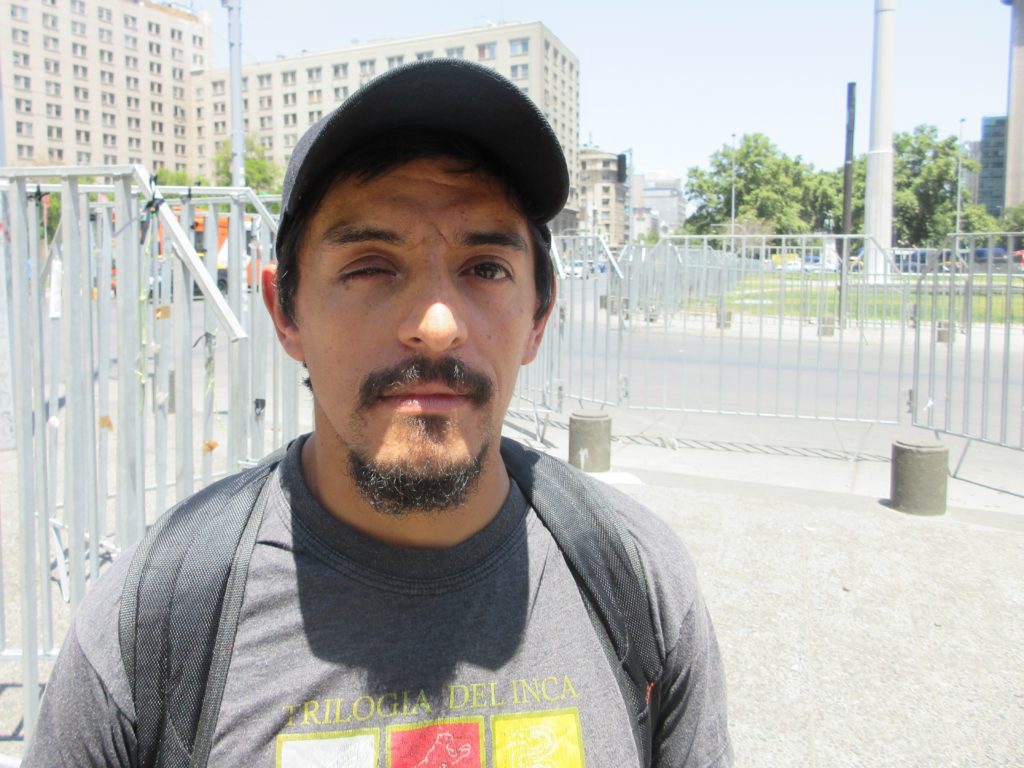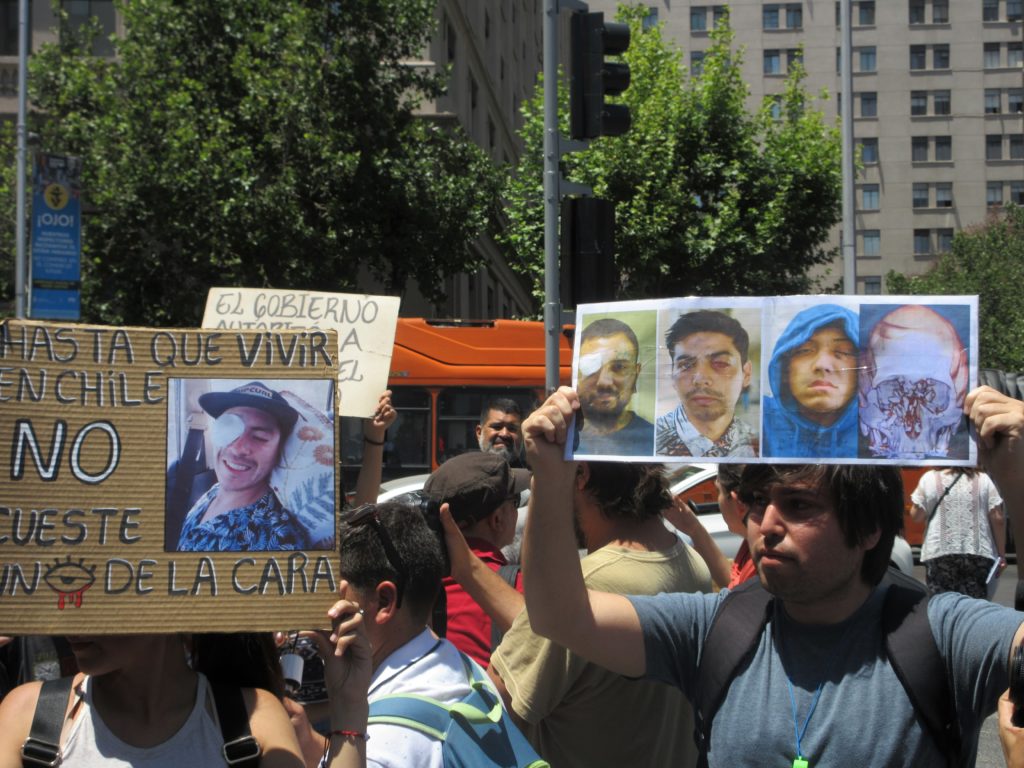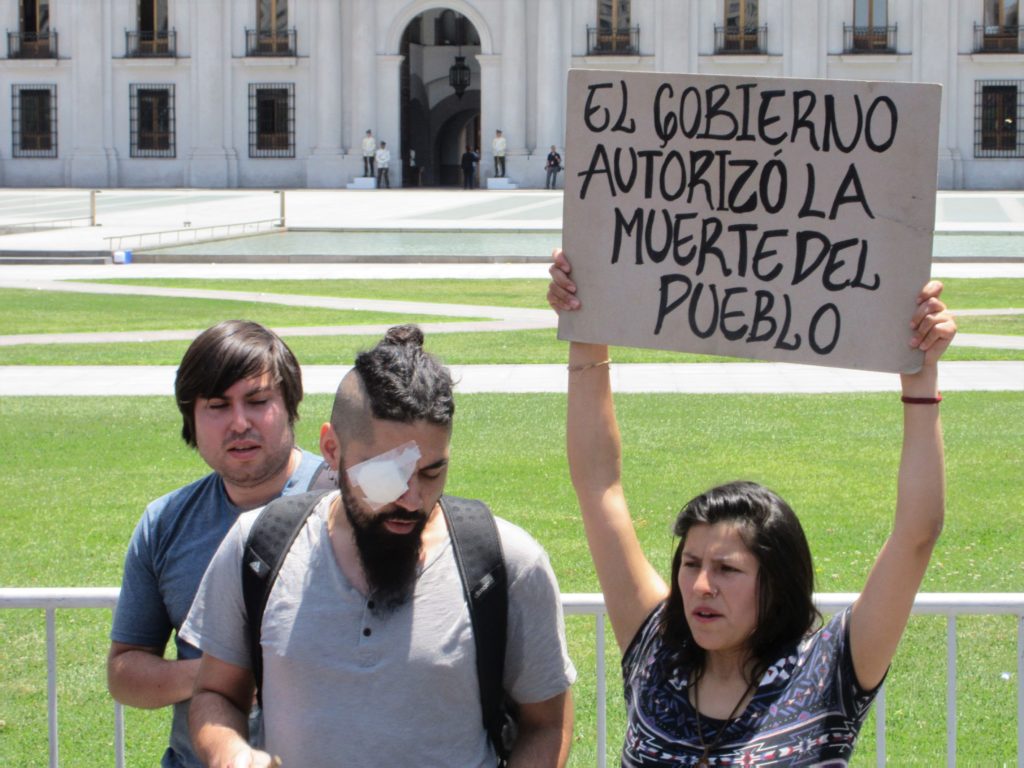Eliecer Flores has been out in the streets of Santiago protesting Chile’s political and economic model since day one. He had to take a break, though, after one of the pellet projectiles fired by police hit him in the right eye.
“My eyeball burst,” Flores, 30, told Toward Freedom. “I got to keep the eye, but not any vision.”
A father of a nine-month-old baby and proud stepdad of a 13-year-old, Flores is originally from Cañete, a city of 34,000 in the Biobio region, 400 miles south of the capital. Growing up in poverty, Flores witnessed injustice and theft by the government, he said.
“I always promised myself that if I had the chance to do something about it, I would,” he said.

Flores got his chance last month. Secondary students in Santiago engaged in mass fare evasion and other actions to protest a metro fare increase. Within 24 hours the whole country erupted in protests against inequality, education and health care privatizations, low pensions and wages, and the neoliberal model itself.
Military and police crackdowns on protests over the past six weeks have been brutal. Thousands of protesters and bystanders have been wounded. At least 26 people have been killed in the upheaval, including five by military and police forces.
“I get emotional every time I remember the comrades who have fallen,” said Flores, his voice catching slightly.
Being completely blinded in his right eye hasn’t stopped Flores from returning to protests. His family is worried for him and it is crucial to be careful, he said, but neither the injury nor the ongoing repression keeps him away. Now he also has a new group with which to organize and protest.
Chilean protesters and bystanders who suffered eye injuries from police crackdowns on mass demonstrations have joined forces to organize themselves and demand justice. Members of an incipient collective of victims of trauma protested Thursday outside the presidential palace, demanding an immediate halt to repression and truth, justice and reparations for the injured.
The new collective, the Coordinadora de Víctimas de Traumas Oculares, is the initiative of Marta Valdés, the mother of an eye injury victim. The group is planning to take joint legal action against Chilean president Sebastián Piñera, Valdés said Thursday at the protest.
For now, the group is comprised of a few dozen people who either suffered eye injuries themselves or are relatives of eye injury victims, many of whom are still in recovery. Now that the collective has made its public debut, other victims and relatives will learn of its existence. Flores joined the group on the spot.
“I just arrived. I found out about it on social media,” he told Toward Freedom while the group marched to the presidential palace.
More than 280 people have suffered eye injuries over the past six weeks of ongoing protests, according to the national doctors association. The National Human Rights Institute, a state institution, has visited 232 hospitalized eye injury victims and says police projectiles caused the wounds in roughly 75 percent of cases.
Police crackdowns have completely blinded at least two people. Student protester Gustavo Gatica, 22, suffered complete loss of vision in both eyes, the treating clinic confirmed Tuesday. That night, police hit Fabiola Campillai, 36, in the face with a tear gas canister while she was on her way to work and doctors were unable to recover any function in either eye, the National Human Rights Institute said Wednesday.
A recent University of Chile study concluded that balines, supposedly rubber projectiles, only contain 20 percent rubber and 80 percent other components, including lead. Pending further study, the Carabineros police director suspended use of the contentious pellets last week except for situations of imminent risk of death of a police officer or civilian. Regardless, Carabineros continue to fire the projectiles at protesters on a daily basis.

Reports by international human rights NGOs documented alleged widespread human rights violations and concluded the government is intentionally injuring protesters. The government vehemently denied allegations of intentional or generalized attacks, but the Minister of the Interior stated Tuesday there is a need for Carabineros police reform and that he ordered the force to review and report back on its protocols and practices.
President Piñera, a billionaire, continues to oscillate between declarations of war and calls for peace. “We are at war with a powerful and relentless enemy,” he said last month. Following initial protests and spates of arson and looting, the government decreed a state of emergency and regional officials established nighttime curfews in many cities.
Under the state of emergency, the military was deployed and given control of public order and security. With the exception of two cases following major earthquakes, it was the first time the Armed Forces were in the streets for domestic purposes since the end of General Augusto Pinochet’s 1973-1990 dictatorship. Thousands of Chileans were killed, forcibly disappeared or imprisoned for political reasons during Pinochet’s rule.
The militarization angered many Chileans, and they took to the streets en masse. The afternoon of October 20, day three of the mobilizations, Flores was protesting in the Plaza Italia, the epicenter of capital city protests, when police cracked down with tear gas and balines. He was blinded in his right eye, but has now recovered from two surgeries: one to close the eyeball, and another to remove the projectile.
As protests continued, Piñera lifted the state of emergency at the end of October and began calling for peace and unity. He eventually ceded to widespread demands for the replacement of the current dictatorship-era constitution and announced a wage subsidy and pension increase, but his proposals fall far short of union and protester demands. Piñera has also been pushing legislators to pass bills, including one to add prison time for wearing a mask while committing any crime or disturbance of public order. Due to the Carabineros’ abundant use of tear gas, most protesters and local residents cover their faces with bandanas or masks.
“The repressive state wants to divert attention. It’s a tactic,” Flores said of the slew of government measures. “They continue with their unbridled capitalism. We need to continue the struggle.”
This week, Piñera reverted to his focus on militarization, presenting a bill that would permit deployment of the military to “safeguard critical infrastructure” without a state of emergency. Both the bill and renewed calls for another state of emergency following further significant property destruction have sparked debate. The Senate president said Wednesday in a press conference he would conditionally support a new state of emergency. The president of the lower house of the bicameral congress publicly rejected measures that would entail the deployment of the military, noting soldiers are trained to kill.
“We are facing a powerful and relentless enemy that does not respect anything or anyone,” Piñera said Thursday in a speech to new police investigator graduates. “We have the right to defend ourselves from this powerful and relentless enemy with the weapons provided to us by the Constitution, the law, and the rule of law.”
Whether the president’s discourse has been of war or peace or back to war, Marcelo Herrera, 32, has been out in the streets protesting. He works his day job at an air quality laboratory, but participates in demonstrations whenever possible. More than anything else, Herrera said he is fighting for social justice.
“Everything should be public: education, health, water. Everything is privatized,” he told Toward Freedom at the eye injury victims collective’s protest.

Herrera was at a protest in Plaza Italia, which demonstrators have renamed the Plaza of Dignity, in downtown Santiago, on November 4 when police fired projectiles, and one hit him in the right eye. His eyeball did not burst and following initial surgeries, doctors are hopeful he will retain partial vision in the eye.
“I can sort of see but as though I were underwater,” he said, slightly lifting one side of the gauze pad over his right eye to reveal the damage. “I still have a couple more operations to go.”
Herrera has had to spend a significant chunk of this month on total bedrest, even sleeping face down due to a partially detached retina. But when doctors orders and his condition allow, he still attends protests. He went to a demonstration earlier this month right before his second operation, and brought a little frying pan and a wooden spoon to make noise at the protest Thursday outside the presidential palace.
“[Piñera] is the biggest culprit of what is happening,” he said. “We want justice. He needs to resign.”
Author Bio
